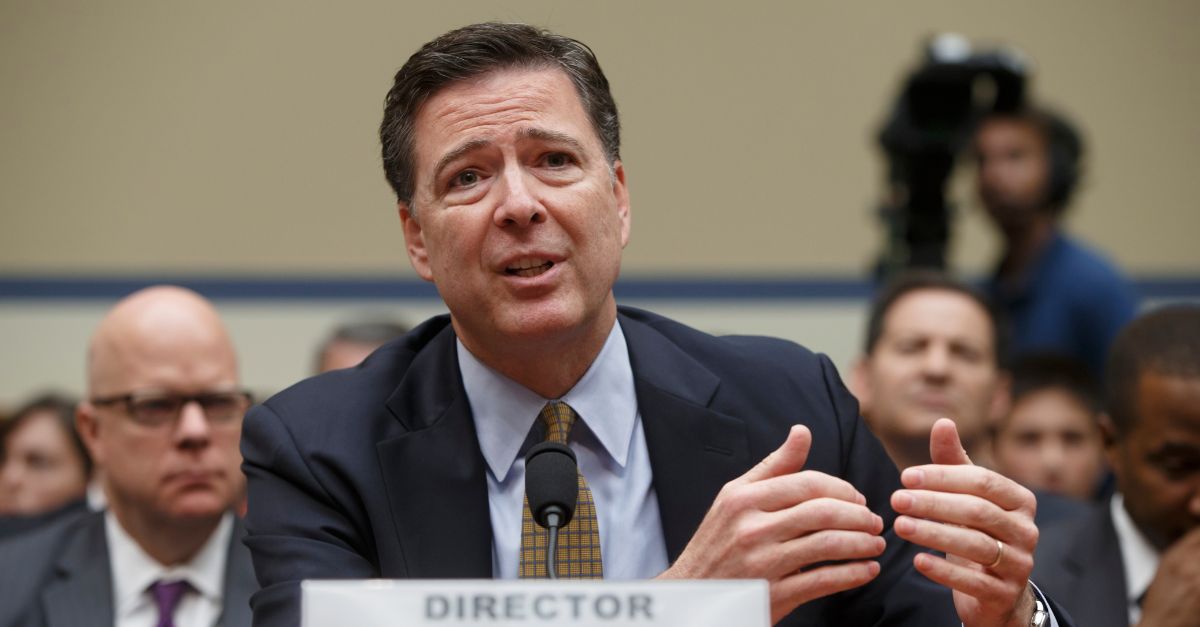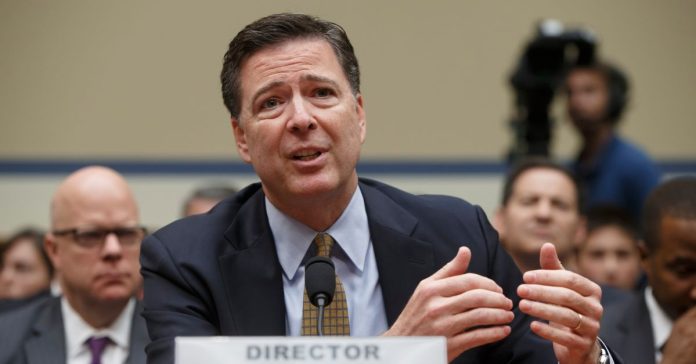
FILE – FBI Director James Comey testifies on Capitol Hill in Washington before the House Oversight Committee to explain his agency’s recommendation to not prosecute Hillary Clinton on July 7, 2016. (AP Photo/J. Scott Applewhite, File)
I would be the happiest attorney in Virginia if I was representing James Comey.
Imagine having the opportunity to represent a former FBI director who has been charged, as The New York Times put it, “[by] an inexperienced prosecutor loyal to President Trump, in the job for less than a week, fil[ing] criminal charges against one of her boss’s most-reviled opponents. She did so not only at Mr. Trump’s direct command, but also against the urging of both her own subordinates and her predecessor, who had just been fired for raising concerns that there was insufficient evidence to indict.”
What you’ve read is just the tip of the iceberg. This is going to be like stealing candy from a baby. Here are the top ten reasons, based on the findings of NBC News, why it’s good to be Comey’s attorneys.
1. The former FBI director was indicted five days before the statute of limitations was set to expire. That means if he wasn’t charged by Sept. 30, 2025, he could never be charged. Seasoned career prosecutors, including Trump’s own appointees, had five years to bring charges. They refused.
2. President Donald Trump publicly said that U.S. Attorney General Pam Bondi should prosecute Comey and Sen. Adam Schiff, D-Calif., and New York Attorney General Letitia James. All three political adversaries.
Love true crime? Sign up for our newsletter, The Law&Crime Docket, to get the latest real-life crime stories delivered right to your inbox.
3. The president posted on Truth Social, his social media platform, his frustration that his political foes have not been arrested: “We can’t delay any longer, it’s killing our reputation and credibility. They impeached me twice, and indicted me (5 times!), OVER NOTHING. JUSTICE MUST BE SERVED, NOW!!!”
4. Lindsey Halligan, the new acting U.S. attorney for the Eastern District of Virginia, brought the charges against Comey despite concerns from prosecutors within her department. Prior to the charges, a senior Justice Department official told NBC News that career prosecutors in Halligan’s office sent her a memo documenting why they believed that probable cause did not exist to secure an indictment against Comey.
5. The president’s appointment of Halligan came after he expressed frustration that her predecessor, acting U.S. Attorney Erik S. Siebert, was refusing to bring charges against Comey. Trump fired Siebert.
6. The indictment was handed down by a grand jury in Alexandria, in the Eastern District of Virginia. The grand jury did not return an indictment on an additional count of making a false statement, according to court filings – some of the Justice Department’s claims were rejected.
7. The government’s case against Comey is based on the testimony of Andrew McCabe, a Comey deputy. McCabe said that Comey authorized him to leak information to the press, according to a 2018 Justice Department inspector general’s report. But the report also found that McCabe made multiple false or misleading statements.
8. The indictment includes two counts: making a false statement and obstruction of a congressional proceeding. The charges stem from testimony Comey made during a Senate Judiciary Committee hearing. He denied that he authorized leaking information regarding the FBI’s investigations into then-President Donald Trump or former Secretary of State Hillary Clinton. He told Congress, “I stand by the testimony.”
9. The Inspector General’s report found that Comey flatly denied, under oath to investigators, authorizing McCabe’s leak to The Wall Street Journal. Investigators concluded that “the overwhelming weight of evidence supported Comey’s version of the conversation and not McCabe’s.”
10. During Trump’s first term, the president directed then-special counsel John Durham to investigate the origins of the Russia investigation. Durham’s team did not charge Comey with a crime, nor did Durham criticize Comey by name in his final report.
This stuff is better for the defense than DNA is for prosecutors in a murder trial.
And it would be funny if it wasn’t such a blatant challenge to the rule of law, shaking the very fiber of our democracy.
Matthew T. Mangino is of counsel with Luxenberg, Garbett, Kelly & George P.C. His book The Executioner’s Toll, 2010 was released by McFarland Publishing. He is a regular contributor to Law & Crime. You can reach him at www.mattmangino.com and follow him on Twitter @MatthewTMangino.
This is an opinion piece. The views expressed in this article are those of just the author.

